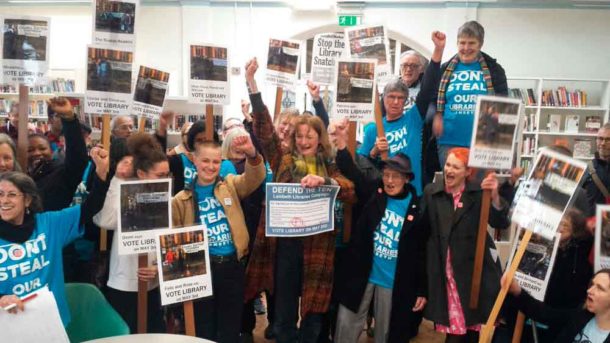
Two former leaders of the organisation chosen by Lambeth council to take over and run the Carnegie library building for the community have reported the council to a committee of MPs, saying that its actions have been “a travesty of local democracy” and display “an astonishing degree of managerial incompetence”.
The Carnegie Community Trust and the council have been discussing an “asset transfer” of the building housing the library from the council to the trust.
The letter also says that voting by Labour party councillors at a planning committee meeting “had all the appearance of a whipped vote” – something that is unlawful in planning matters.
And it says a freedom of information enquiry by Lambeth People’s Audit reveals that an assurance given by the leader of the council and the then chief executive in 2015 was “at variance with the facts”.
The letter is from Carol Boucher and Fred Taggart, both former Labour councillors for Herne Hill where the Carnegie building is sited. Until he retired, Taggart was projects director for the Prince’s Regeneration Trust, advising community groups on the sustainable re-use of redundant and under-used historic buildings.
Their letter is to Clive Betts MP, chair of the House of Commons housing, communities and local government committee, which scrutinises the work of the government’s Ministry of Housing, Communities and Local Government.
It comes as local library campaigners Defend the Ten, the Green Party and some independent local politicians launched a bid to make libraries an issue in forthcoming local elections.

Defend the Ten and its supporters remain vocal critics of Boucher and Taggart, who, they say, have acted in collusion with Lambeth council.
Lambeth council and local Labour party councillors expressed confidence in the asset transfer process and pointed to the council’s successful transfer of its Upper Norwood Library to the management of the Upper Norwood Library Trust.
Fundamental failing
Boucher and Taggart’s letter says that the experience of the Carnegie Community Trust (CCT), of which Boucher was the chair and Taggart the secretary, reveals a “fundamental failing” in the Localism Act 2011 – which was the basis for the planned takeover, known as an asset transfer, of the Carnegie library building by the CCT.
They say the asset transfer process created by the Act leaves councils with total control and confers no rights on community groups, who are expected to undertake huge amounts of work with no guarantee that they will eventually be able to take over a building.
Their letter asks the committee of MPs to “look further” at the issues revealed by the way Lambeth council has behaved, saying that, with no public discussion or involvement, it “subverted and destroyed” the basis on which the community trust had sought to take over the building, leading to the waste of five years of work.
The letter says that: “We wish to protect other well-intentioned community groups of volunteers from being similarly undermined and subverted in this way. If they cannot be protected then the asset transfer process is so profoundly flawed that no community group should be encouraged to embark on the enormous amount of work and expense involved in preparing an asset transfer application.”
Boucher and Taggart say the group of local residents that they led – but have now resigned from in protest at the council’s actions – had, since 2012, spent an enormous amount of time and about £100,000 of grants and other funding working on plans for an asset transfer of the library building to the trust.
They point out that their business plan had been approved as viable by the council’s advisors, accountants PWC.
Their letter to the committee of MPs says they became “very alarmed” in 2015 when the council announced it was placing its leisure services provider GLL (now rebranded as Better) in the Carnegie building.
At a meeting with the leader of the council and its chief executive they were told that this was part of the council’s healthy living policy and in no way connected with its leisure services contract with GLL.
But, the letter says, a freedom of information request by Lambeth Peoples Audit revealed this assurance was “at variance with the facts” and that the arrangement with GLL was in return for a reduction in the cost to the council of its contract with the leisure supplier and a donation to a charity supported by the council.
The letter goes on to say that this deal also means that GLL will run a gym in the Carnegie building rent-free until 2022 and after that for less than half the market rate.
It says there was no public debate and that the gym proposal was not included in a public consultation on the council’s “cultural services”.
The council’s deal with GLL made the business plan of the trust unviable.
The letter also expresses concern and amazement at the council’s treatment of a historic listed building and the amount of money it has paid to excavate its basement for a GLL gym.
It adds: “The planning consent for this work, which was opposed in hundreds of local and scholarly objections, was passed at a meeting of the planning committee in February 2017 where all the Labour members voted in favour and one other opposed. It had all the appearances of a whipped vote, which, as you will be aware, is unlawful on town planning matters.”
Boucher and Taggart say: “The inept and technically incompetent political leadership of Lambeth council has thoroughly enraged the community, potentially costing the council tax payer up to £2.5million facilitating works for GLL, while the council will retain responsibility for capital works to the building and secure no income from it.”
Council confident
Herne Hill councillor Jim Dickson said: “The council has successfully achieved a number of asset transfers over the years and is confident that the transfer of the Carnegie building to the local community will also be successfully accomplished in partnership with the Carnegie Community Trust.”
A Lambeth council spokesman said: “The council is still working with the Carnegie Community Trust (CCT) and the group are in position to take over management of the building soon.
“The council recognise the huge amount of work the group has done and by working with them and GLL over the coming years, we will keep the building, and library, open long into the future.
“GLL will work in a new part of the building, taking nothing away from the community and library use, and future rent will include a share of profits from the gym.
“The work on refitting the building has not gone over the agreed budget and is on track to open fully later this year.
“Lambeth council has successfully undertaken several asset transfer agreements in recent years and we hope that the Carnegie and CCT agreement will work in much the same way as Upper Norwood Library, under the management of the Upper Norwood Library Trust.”
You can read the full letter here.
Helen Hayes, Labour MP for Dulwich and West Norwood, whose constituency includes parts of Brixton, is a member of the House of Commons housing, communities and local government committee.







[…] https://brixtonblog.com/council-reported-to-mps-over-carnegie-library/50129 […]
The letter exposes the undemocratic and financially wasteful approach the Council has taken to the future of the Carnegie library. Yet the Council intends to continue working with the remainder of the CCT to implement their clearly impractical plans, and plans which reduce the library space to a single room. The alternative plans of the genuine community trust, the CLA (carnegielibraryassociation.org.uk), should now be reconsidered by the council for a real sustainable alternative to either CCT or GLL management of the library.